Fisheries in the Mediterranean and the Black Sea provide countless jobs and are a source of livelihood for close to one million people. They are fishers, seaweed or fish farmers, vendors, cooks, researchers and more.
Many of them are women. 8 March 2022 | This International Women’s Day, meet: Huriye, Andrejka, Hanadi, Nadia and Stefania – some of the women working in the fisheries and aquaculture sector in the Mediterranean and the Black Sea:
Huriye Göncüoğlu: every day I see the solidarity amongst women in fisheries getting stronger 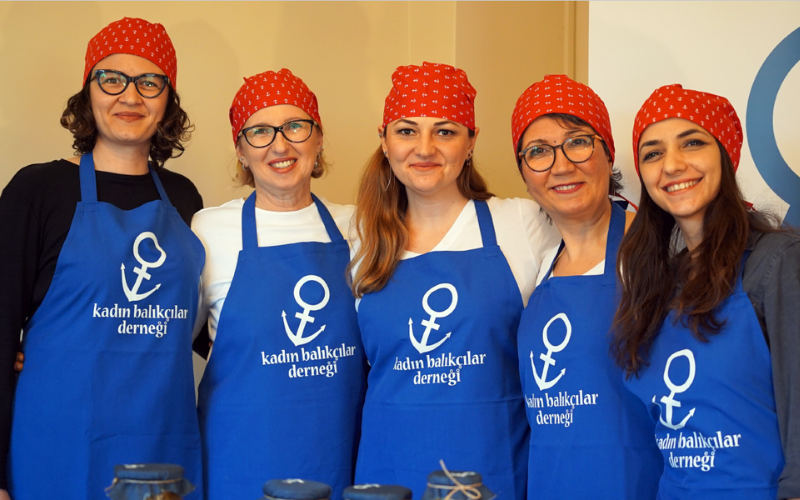
Huriye Göncüoğlu (left) with the women of the association for women in fisheries ©Huriye Göncüoğlu Forty-one-year-old Huriye is the president of an association for women in fisheries based in Ankara, and a lecturer at the Faculty of Fisheries at Ege University in Turkey. It’s obvious when talking to Huriye that the sea and fishing are close to her heart. So is the need for greater recognition for the women who have been working in fisheries in Turkey for centuries. “We are sea people. We are married to the sea,” says Huriye. With a lifelong passion for the sea, in 2007, Huriye submitted her Masters’ thesis proposal: the role of women in fisheries. It was received with little enthusiasm, she says, but she didn’t let this deter her. “Upon entering women’s boats and homes, I found that I was not able to leave, and this opened a whole new chapter in my life,” she adds. “Across the fisheries sector, women work hard, but do not receive sufficient recognition and often do not have a seat at the table.” This is what the association she leads is working to change. Established in 2019, the association has been strengthening the leadership and entrepreneurship skills of women working in fisheries; supporting fisher families hit by natural disasters; promoting a sustainable blue economy, by processing and canning discarded fish, for example; and protecting marine and costal ecosystems. “Thanks to our work, Turkey’s main fishers’ association now also accepts women as members, and it hosts a commission for women in fisheries,” she says. “Fishing is an old profession. Men and women have been working side by side for centuries. But to our day, it is still generally considered a man’s job because of gender inequality and a lack of data on women in fisheries. This needs to change,” she stresses. “I hope that women grow stronger and stand up for their rights more. Every day I spend in this sector, I see that women’s solidarity is getting stronger,” concludes Huriye.
Andrejka Bonja: I like my job as fish vendor, being at the market and in touch with people 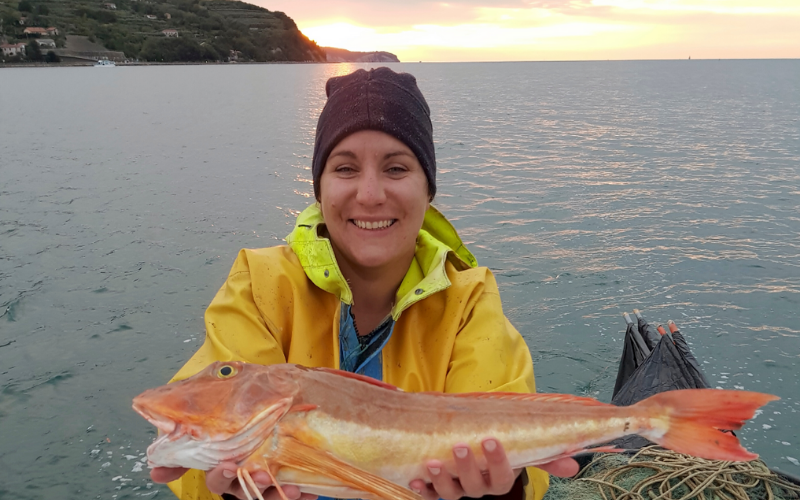
Andrejka Bonja sells fish but also goes fishing with her husband ©Andrejka Bonja Thirty-seven-year-old Andrejka has lived in Koper all her life. Fishing or anything else to do with fish is part of everyday life in this city nestled on Slovenia’s Adriatic coastline. Andrejka’s husband, Renato, is a fisher and she sells his daily catch at the market. Sometimes, she would also go fishing with Renato. The couple has been working together, catching and selling fish, for over a decade. “I like my job. This is why nothing is difficult for me. I enjoy being at the fish market and in touch with people,” she says. “It’s a full-time job though having fish every day is tough,” she adds. “When the winds are strong, when the weather is bad, my husband can’t go fishing, and I have no fish to sell,” she explains. When there is fish to sell, Andrejka starts work at 6 a.m. She is at the Koper fish market, Monday to Saturday, from 07.00 until she gets to sell all the fish. When her husband gets back from fishing, late evening, she is at the port, helping him with the catch of the day. “We sell fish pending on the season. When seabream is in season, I sell seabream. Customers usually like seabream or seabass. But we have a range of options, from moles, cod to mullet,” she says.
Hanadi Taleb: fishing nets – a safety net for hundreds of women 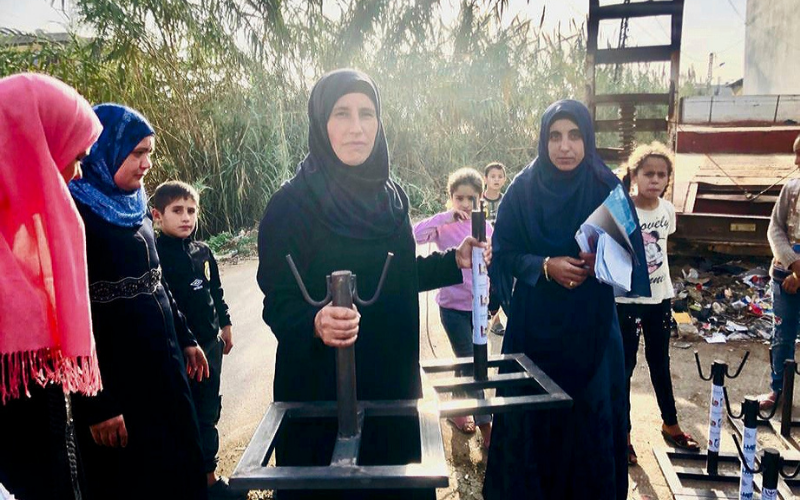
Hanadi Taleb (right) with some women of the cooperative carrying tools to make fishing nets ©Hanadi Taleb Thirty-year-old Hanadi is the head of a women’s cooperative in Bebnine, Akkar, in the north of Lebanon. The cooperative makes and mends fishing nets for local fishers. Its mission? Help women help themselves and their families. Over 150 women are part of the cooperative. Amongst them, refugees from Syria. The region of Akkar hosts some 250 000 Syrian refugees. Many of the women supported by the cooperative the sole breadwinner, and have a large family to take care of. Their age ranges from 17 to 50. Some of the younger women are students and are doing this work so that they can support themselves and continue their studies. The cooperative trains the women in making and mending fishing nets for local fishers, helping them make a living. For each fishing net, they earn about USD 50. Hanadi has been at the helm of the cooperative since 2011. What motivates her to do this work? “I’m doing this because I want to help women,” she says simply.
Nadia Selmi: seaweed for a better future 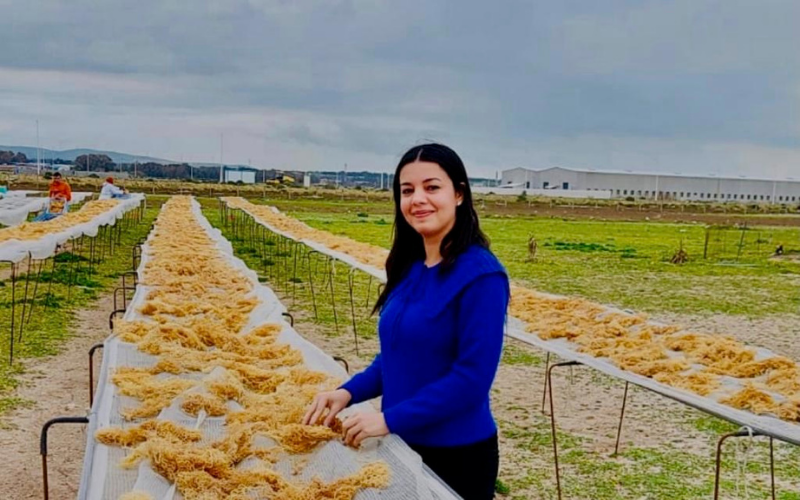
Nadia Selmi at the seaweed farm ©Nadia Selmi Thirty-four-year-old Nadia Selmi is a food engineer. Her passion is all things to do with seaweed. The place where she works in northern Tunisia is transforming the future of hundreds of local women but also the future of food and of many other industries. The local women farm seaweed, which then gets transformed into a powder. This powder is used as a vegetable gelatin, replacing animal-based gelatin in many food products – from dairy to sweets. It is also used in pharmaceutical and cosmetics products. And more recently, this seaweed powder is also being transformed into bottles and bags, making these previously plastic items biodegradable – good for the environment and the people. “I believe in the power of women. The seaweed farm is run by women, and women represent 80 to 90 percent of all staff in administration, in the labs and research,” says Selmi. Selmi herself first started working as a researcher in the lab and is now the commercial director of the seaweed company, called SELT Marine. Over 100 women work across the seaweed company in Tunisia.
Stefania Cori: the cook whose family has been in fisheries for 100 years 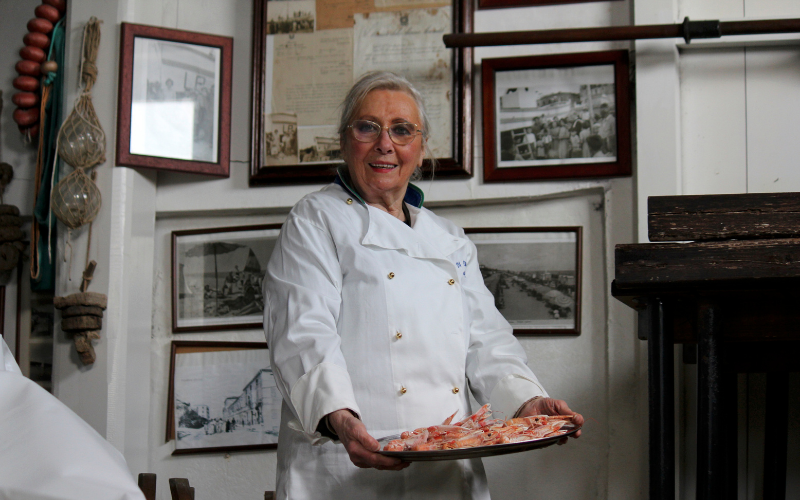 Stefania Cori in the kitchen of her restaurant ©Stefania Cori Stefania Cori in the kitchen of her restaurant ©Stefania Cori
Stefania Cori speaks passionately about the history of her family. She lived all her life in Palombina, a coastal town in eastern Italy. Her grandparents moved to the town 100 years ago – literally – and her grandfather became a fisher. He even built his own boat, which was then passed on to Stefania’s father, also a fisher. The family opened a restaurant next to the sea when Stefania was a teenager. Her father would fish and her mom would cook fish-based dishes. When her parents got older, Stefania took over the restaurant. At 79 years old, she is still the head cook and prides herself on making the food by hand. The pasta and the bread are all handmade. She still prepares the fish the way her mother used to. She is famous for a dish called padellata– a mix of seafood (mussels, clams, Norway lobsters and crabs) and pasta. “Now others also cook padellata. They copied my recipe,” she says with a laugh. “I only cook with fresh fish. I don’t want to have more than 50 customers as everything I do is fresh, and cooked with my bare hands,” she explains. Her food attracts many locals and visitors, but so is the restaurant’s setting. Its walls are adorned with black and white photos. Here is her grandfather with other fishers on his boat. There is her father fishing. Fishing nets are used as tablecloths or as decorations. “I didn’t want to get rid of anything. I wanted to keep my mother’s furniture, I wanted to show the history of my family,” she says. “I was born here. I always lived near the sea. This is my life. I can’t live without the sea,” concludes Stefania. WHAT IS THE GFCM DOING FOR WOMEN IN THE REGION? | The GFCM’s work is crucial for the sustainability of fisheries and aquaculture in the Mediterranean and the Black Sea and for the countless people who depend on it, including women like Stefania and Huriye. The role of women in fisheries is often invisible. Overlooked by data collection, absent from legal frameworks, unrepresented in industry forums, women’s contributions often go unacknowledged. The GFCM is working with countries in the Mediterranean and the Black Sea to change this. One example of this is the Regional Plan of Action for Small-Scale Fisheries in the Mediterranean and the Black Sea (RPOA-SSF) that promotes the role of women in small-scale fisheries. Through the RPOA-SSF, and thanks to the strong support and contribution of the European Union, the GFCM is providing guidance to countries around the region on how best to gather relevant gender-disaggregated data. Once this data is analysed, it can be used as the basis for targeted projects and initiatives to redress the balance and ensure women are better accounted for and acknowledged.
Find out more about how we're redressing the gender balance. | | 





